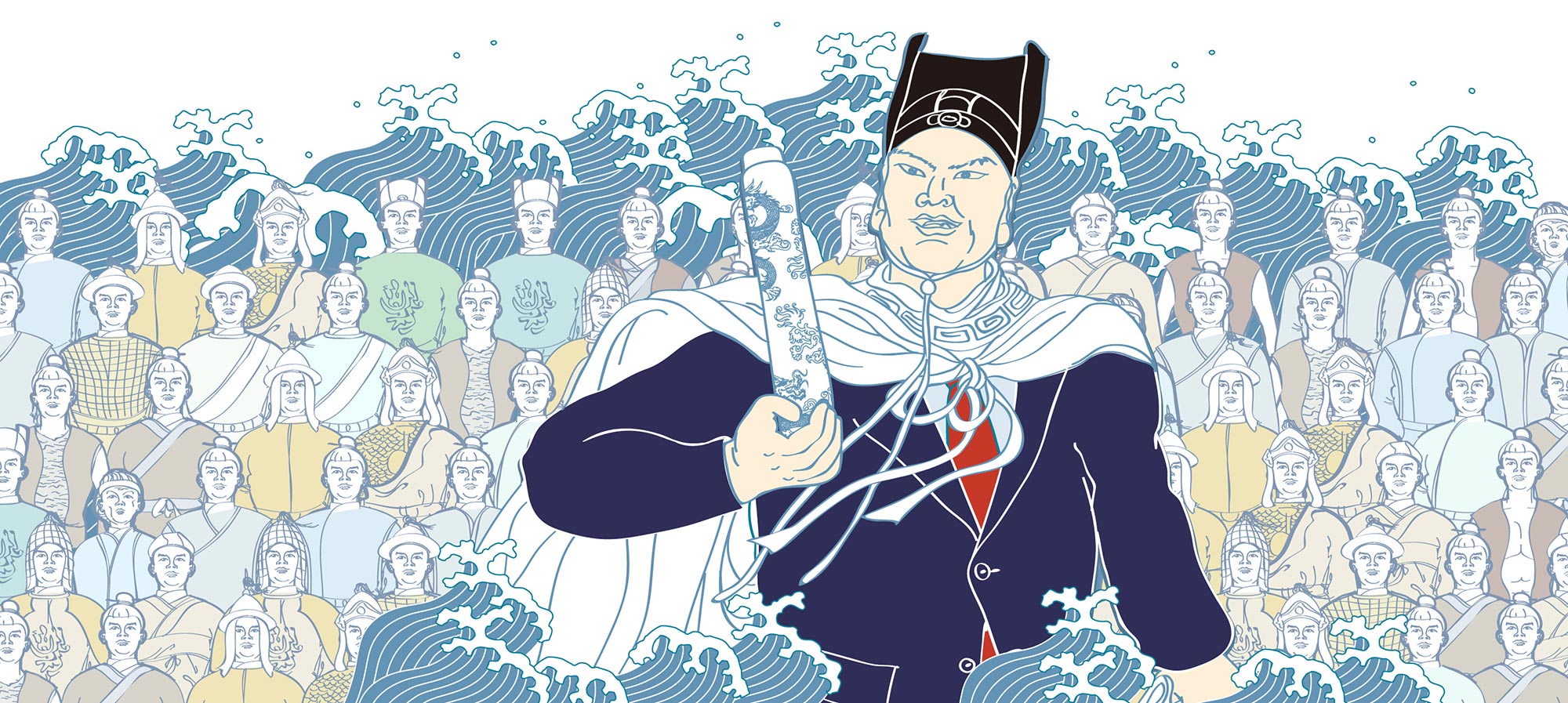Imagine the supreme challenge of motivating 27,400 people in an enormous floating corporation, waves buffeting your 240 separate offices with limited channels of communication, managing the uncertainty of landing in more than 30 countries, ports often lacking the critical supplies you desperately require, while trying to contain insubordinate staff and remaining vigilant against surprise takeover attempts.
And that was just the first journey. Zheng He, the legendary eunuch admiral of China’s Ming Dynasty, did it seven times, logging a cumulative total of 160,000 nautical miles.
Zheng He backstory
Born “Ma He” in 1371 to a Muslim family in Yunnan, he witnessed the wartime slaughter of his family and was captured by the Ming army before enduring the “cruelest cut” at age 10. As fate would have it, young Ma He ended up a trusted eunuch in the palace of Zhudi, the northern Prince of Yan, soon to become the Yongle emperor. His nickname “San Bao” (lit. three protections) derives from his being the third born of six children and was coopted as a Buddhist honorary title for him meaning “three treasures.” He persevered to achieve fame as a military officer, waging battles against the Mongols threatening the Ming’s northern borders, prompting the Yongle emperor to award him the new surname “Zheng” and later entrust him with leadership of the dynasty’s massive overseas cultural journeys.
But CEO…is that too big of a leap? We need a modern comparison.
Let’s take a closer look at how Zheng He performs based on the 21st century leadership standards of Entrepreneur magazine’s 5 Core Responsibilities of a CEO:
1. Own the vision
The prodigious Yongle emperor (builder of the Forbidden City) selected Zheng He above all other chief executive candidates based on a deep trust and affection. Following the emperor’s mandate, Zheng He activated the vision of spreading the seeds of Ming culture.
In his seven voyages from 1405 to 1433, admiral Zheng He and his enormous fleet covered ports of call from Southeast Asia westward to India, the Middle East and Africa. His multi-ocean journeys began nearly 90 years before Christopher Columbus, who set out to find a shorter route to Asia. Gavin Menzies in his controversial bestseller 1421: The Year China Discovered America even claims that Zheng He beat Columbus to the punch.
Bold speculations aside, discovering new western worlds was hardly Zheng He’s intention. His diplomatic expeditions sought tribute from known states, and in return, offered silk, porcelain and other rare gifts, plus “big brother” protection and trade opportunities. Dr. Zhang Xingang, President of Hong Kong City University, suggests that China also wanted Middle Eastern allies to offset the powerful nomadic peoples on its western front. But first and foremost, the journeys were intended to impress others with the dynasty’s greatness and grandeur.
“Trying to picture what settling other planets might entail? One place to look is 15th-century China.” – Charles Mann
2. Provide the proper resources
Zheng He faced a daunting challenge managing human and physical resources during a time without computers, bar codes and RFID chips. The work started long before they set sail. During his career, Zheng oversaw the preparation of upwards of 1400 naval vessels including massive treasure ships, the largest measuring 480 feet (160 meters) in length with 12 sails, 4 decks and full load of 7,000 tons.
Filling those ships required a complex sourcing initiative – from full collections of herbs & remedies to spare parts for virtually everything – along with a commensurate training and development effort. National University of Singapore (NUS) professor Hum Sin Hoon identifies the seven voyages as having built up a floating supply chain spanning Asia to the Middle East and Africa, and views Zheng He as an early trailblazer of China’s open-door policy.
3. Build the culture
Here’s the easiest of the five CEO responsibilities for Zheng He. Any sailor or specialist seeking out an odyssey of this magnitude almost certainly would have been drawn to its high risk adventure. And among the crew and soldiers forced to go, well, it’s either get with the program or get tossed overboard. That said, the opportunity to travel or relocate to exotic faraway lands, spreading cultural expertise while spending state money, doesn’t sound like an unattractive career option.

4. Make good decisions
In terms of ship-to-ship communication, Ming era author Luo Maodeng, in his novel Voyage of the San Bao Eunuch, describes how crews remained in touch during changing conditions:
- Ferry boats – to courier and exchange information
- Signal flags – to message during day time
- Lanterns – for nighttime communication
- Sound Signals – drums and trumpets for dark or foggy conditions
The Yongle emperor expressed supreme confidence in his admiral’s managerial and decision making skills. Zheng leveraged the talents of his top nautical advisors to guide his fleet to faraway lands, after all, before his first journey, he had no previous naval experience!
Charles Mann in Wired Magazine on the daunting challenges of interstellar voyaging writes, “Staggering in price, formidable in technical sophistication, unprecedented in level of national commitment – Zheng’s voyages remain the closest functional equivalent to the cost, effort, and risk required to travel into deep space.”
5. Oversee and deliver the company’s performance
CEO Zheng He owned full responsibility for his floating corporation’s performance, albeit shielded by the Yongle “Chairman” who commanded the money to be spent on this cultural expansion venture. As such, there was no direct accountability to equity holders or boards of directors, with Ming scholar-official having little or no say in the matter.
So did Zheng He as CEO ultimately achieve what he set out to achieve? Beyond giraffes and other overseas oddities returned to the Ming court, did he bring real value to the dynasty in terms of cultural expansion, trading partners, respect and face?
It appears so, given the emperor endorsed Zheng to set sail seven times during a 28 year CEO tenure from age 34 to 62. Alas, we would know much more on the subject had it not been for the anti-eunuch, anti-exploration Ming bureaucrats burning nearly all the records of these incredible voyages in the aftermath of Yongle emperor’s reign, during an era when China again turned inward, allowed its world-leading naval fleet to slip into disrepair, and expanded the Great Wall.
A visionary message
Zheng He’s central message, according to professor Hum Sin Hoon, is collaboration based on goodwill, coming from strength. Dr. Hum says, “The benefits involve a matter of peace and goodwill for everyone…a major lesson for today’s world, how to build that collaboration, that is peace-based and sustainable.”
Food for thought in a chaotic 21st century world struggling to find common ground among its peoples and cultures.










Interesting points, @David_LloydJones:disqus . Along the same lines, I enjoy Jared Diamond’s books “Guns, Germs & Steel” as well as “The World Until Yesterday.”
When Zheng He and Columbus got to America they found there were people already there — so it was clearly a wee bit late for either one of them to discover the joint. Ditto for the Vikings.
Fromm the DNA it seems that the discoverers walked across from Siberia — which I guess might allow those Mongol or Qing types to put in a claim as the discoverers.
When it comes to discovering and claiming land, I think it makes us appreciate the wisest words Richard Nixon ever penned, “We come in peace for all mankind.” I would not be at all surprised to see the Chinese having bases on planets and asteroids some time soon, so it’s kinda nice that America got there first and did the right thing for once.
-dlj.
Is it possible to be all “warred out”??? Make Love Not War! New interpretation is, war has depleted too many people, so need to procreate to make more able bodied warriors. Thus maybe half a generation of peace, until fully replenished. Then let the war drums roll.
70 year anniversary of the surrender of Japan is coming up this year. Seems the Japanese are itching for war again, especially under Abe–been peaceful too long, a whole generation not knowing war.
There does seem to be a historic cycle with the pendulum swinging between “war is hell” and “give war another chance” based on the fading of earlier bad memories. Some would argue, however, that it’s all about power and greed, the ego’s natural inclination. What do you think?
This is not the American way–not making war when so capable, no exploitation and not subjugating but trying to win them over. What gives?
Could be something to do with all the war and chaos China experienced throughout its history, so by the Ming era, they realized it’s better to work with soft power and alliances to advance their interests.
Stew,
You don’t think they’d maybe conquered everything within reach of Center Country, and simply ran out of people to have a war with?
Your idea has an appealing good sense to it, but it would have to involve some race other than Earthlings.
-dlj.
We don’t have a good track record on that as a life form, do we? There are numerous examples where China, unable to fund a major war or dominate a potentially dangerous neighbor, resorted to other means to neutralize them. Do you think it’s in our human DNA or a function of the ego to want to conquer others and there’s no overcoming that urge in the coming centuries?
Stew,
Excellent point. The good news is, for about 7,000 years now we’ve externalized a great deal of our evolution from our DNA to our language. Once we did that we started to give up the spear — if only because we’d run out of mammoths, emu, and other stuff to kill — and worked on trade and settlements. Then gardens bloomed into agriculture, agriculture begat astronomy and chemistry, and we’re maybe on the way to peace.
The United States, which has the most outdated cities, the crudest most anti-democratic politics, and the most volatile tendency to send in the bombers, is still a bit of a problem. Even there, though, there’s good news: the only war they’ve won in eighty years is Grenada, with a draw in Korea, their best big one. The election of President Obama was perhaps a sign that they’re beginning to figger it out. Chinese and Indian engineers still get paid more in America than back home, so for the moment their economy is safe, but eventually they will have to try an education system, and again Obama is pointing out the right direction.
Meanwhile it’s a pleasure to see Paul Ryan going “Who me? I was nowhere near that cookie jar” about his childhood Ayn Rand fixation.
Cheers,
-dlj.
Some people have asked about other major explorers of the age…Columbus first arrived in the Americas in 1492; Magellan is credited with circumnavigating the globe in 1521 even though he died fighting in the Philippines; Leif Ericson and the Vikings predated them both as well as Zheng He by reaching Newfoundland in the 11th century, though it’s hard to make perfect “apples to apples” comparisons.